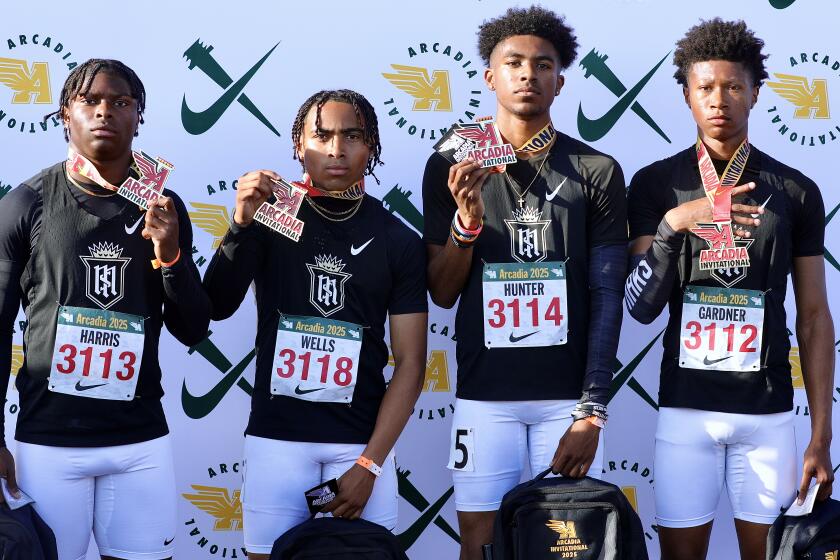Survey Says . . . Officially, Refs Fare Pretty Well : Who’s No. 1: The voting turnout was slim, but City Assn. referee Terry McIntire, with five votes, was selected as the best overall high school basketball official in San Diego County.
- Share via
SAN DIEGO — Given an opportunity to orally stone the county’s referees, area high school basketball coaches did not turn into a mob.
And get this: Some of them even said the guys wearing black-and-white stripes are doing a good job.
But such blasphemy was not universal in an informal poll of 38 of the county’s 55 2-A and 3-A coaches. Many offered no opinion on who was the best overall referee, on who was the quickest to call a technical foul and even on who they most hated to see take the court.
But while some coaches praised the officials and others turned mute, many voiced their displeasure with the current officiating situation in San Diego County.
Some City and Metro Conference coaches went out of their way to bemoan the “homer” calls they claim their teams get in the gymnasiums of North County schools. The North County has its own referees association, and coaches in the south seem to think it employs a different philosophy than the City Assn.
Others complained about the lack of traveling calls, or the lack of consistency, the falling talent level of both associations as their top referees skip high school assignments and do college games.
But, hey, there will be plenty of time to complain later. Let’s get to the good stuff.
BEST OVERALL
The top five vote-getters in this category all hail from the City Assn.: Terry McIntire, five votes; Ron Filson, four; Doug Dannevik, Mike Morrow and Tom Wood, all three votes.
Now before you get the idea that the vote tally is a little low, consider that coaches historically have been apprehensive about rating officials.
“In the past,” said Dennis Ackerman, the city assignment secretary, “we tried to have coaches rate the referees, and we found that they didn’t respond. And this year we tried it again by sending out a form at the beginning of the year, and we still don’t have any responses.”
The coaches who responded to The Times’ survey all agreed on what makes a good official.
“The best thing for me,” said a City Harbor coach who asked that his name not be used, “is when I walk off the court I can’t remember who the official was. Then I know the officiating was good.”
Doing a game incognito seems to be a goal of officials.
“They say the least amount of attention we bring to ourselves, the better job we’re doing,” McIntire said. “And that’s probably true to a certain extent.”
“I’m just a working part of the ballgame,” said Filson. “If (the coaches and players) can go away and not even know I was there, then I feel good about it.”
Filson doesn’t always walk off the court unnoticed.
“He comes into every game as if the kids are the main event,” said Mira Mesa’s Tim Cunningham. “He’s such a cordial person. He doesn’t come in with that, ‘Hey, I’m running the show, and if you question what I’m doing you’re going to get nailed.’ Most of the time he’ll listen to you. If you say ‘Hey, that kid was in the key,’ he’ll say, ‘I’ll watch it next time, thanks coach.’ ”
High school coaches are not alone in their recognition of Filson’s and McIntire’s talents. McIntire has worked Division I women’s games in the Pacific 10, Big 10 and West Coast Conference for five years. Filson received his first two Pac 10 men’s assignments this year.
Though McIntire registered the most votes for best overall, he also was named by a Metro coach as the official that coach most hated to see.
“I would hate to see that guy walk on the court because he doesn’t hustle,” the coach said.
But McIntire said he hustles at each game.
“I think when you take the court you’ve got to think that that’s the most important game for those 20 players on that particular night,” McIntire said. “You’ve got to realize they’ve gone out and put in 12 to 14 hours of practice or preparation. No matter if you worked at USC the night before in front of 5,000 people and you’re at a high school game in front of a couple hundred the next night, it’s still the most important game for those players on the floor and that’s the philosophy I take.”
Officials who received two votes in the survey were Bob Countryman, Mike Heintschel, Dave Libby, George Milke, Rick Nelson and Jim Sullivan. Another 24 referees received one vote each.
Like McIntire, Heintschel and Nelson also received one vote under, “Who Do You Most Hate to See Take the Court?”
QUICKEST TO T AND LEAST LIKELY There was no clear-cut choice in these two categories. But a few names appeared in each.
Doug Dannevik, whose name was mentioned in four of the five categories, was named by two coaches as least likely to call a technical foul and by another coach as quickest to call one.
Dannevik and Ken Perez were the only two officials to receive as many as two votes in least likely to T.
Cal Evans was the only referee to be named by two coaches as the quickest.
Other officials who received one vote in each category were Tom McConnel and Mike Morrow.
Many coaches felt the issuing of quick technicals was a negative quality, but one City Central coach was understanding.
“In many cases, the T is the only haven for an official,” the coach said. “It needs to be applied when coaches lose it. It’s the only thing that puts them in charge.”
The same coach also cautioned about its over use.
“The best officials use it sparingly,” he continued. “They’ll come by and say, ‘Coach, that’s enough.’ If you don’t pick up on that, you’ll get a technical.”
Added Madison’s Jim Thompson, “I don’t think it’s a
trait of a good official that he can call a technical. I think it’s a good trait if you can hold off on calling a T.”
MEADOWLARK LEMON AWARD
Bob Moss, the overwhelming choice for Biggest Clown with 18 votes (second-place Barry Allman got two), was also mentioned by a coach as the referee who whistles traveling most often.
“But I think he likes to call traveling,” the coach said. “He gets on a roll with that call and really puts on a show.”
Bob Moss entertains. He doesn’t just make a call--he dramatizes it.
On a typical hacking call, Moss sometimes goes into the following sequence:
“No. 43, YOU GOT HIM ON THE ARM . . . YOU GOT HIM ON THE ARM . . . YOU GOT HIM ON THE ARM,” he’ll pontificate while repeatedly slapping himself on the forearm.
Moss then takes his show to the scorer’s table:
“Foul on No. four-three, and in case you didn’t hear me, HE GOT HIM ON THE ARM . . . HE GOT HIM ON THE ARM . . . HE GOT HIM ON THE ARM,” again repeatedly slapping himself on the forearm.
Mar Vista’s George Anderson recalled a particular instance when he organized a charity game featuring some Charger players against the staff of radio station 91X. Moss officiated.
While the crowd came to see the Chargers and disc jockeys, most got the biggest kick out of the referee’s antics.
“He just stole the show,” Anderson said.
Moss’ sense of humor has allowed him to develop a strong rapport with players.
“I think the kids enjoy having him ref the game,” said Hilltop’s Chip Holmes.
Moss is the first to acknowledge that not everyone cares for his act.
“It’s cost me some assignments, some ratings,” he said. “But when I go on the court, players say, ‘Hey, we have that good ref today.’ ”
A City Harbor coach put Moss’ clowning in perspective: “When things are going well, the fans, players and coaches enjoy it. When things are going wrong, it irritates you. He showboats.”
GENERAL OBSERVATIONS
Coaches were split on the overall quality of referees.
University City’s Ted Medigovich, for one, stuck up for them.
“I’m happy with the officiating,” he said. “I firmly believe that in 95% of the games, the referees don’t affect the (outcome). I don’t like to blame them. It isn’t their faults. So many coaches use them as scapegoats. I’ve seen some coaches get so wrapped up in what the referees are doing that they neglect doing what they’re supposed to be doing, which is coaching the kids.”
Another City West coach didn’t agree.
“There’s inconsistency, and that’s what bugs the kids,” said Kearny’s Bill Peterson. “In three games we went from 45 to 25 to 10 times to the free throw line. How can that happen? I think a lot haven’t played and they don’t see what’s going on on the court.”
Others realized that they were in no position to cast stones.
“When the kids play perfect games, and we coach perfect games, we can start asking for perfect officials,” said one City Harbor coach.
Kim Berkshire, Rick Hazeltine, Jim Lindgren, Dave McKibben, Scott Miller, Laura Palmer and Don Patterson contributed to this story.
More to Read
Get our high school sports newsletter
Prep Rally is devoted to the SoCal high school sports experience, bringing you scores, stories and a behind-the-scenes look at what makes prep sports so popular.
You may occasionally receive promotional content from the Los Angeles Times.






